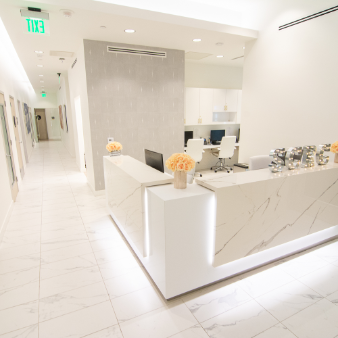

When you have been through the heartbreak and stress of infertility, sometimes for years, discovering that you are pregnant after IVF can bring mixed emotions. You may expect the joy, relief, and excitement, but for some women, the undercurrent of anxiety can be overwhelming. The most common fear is pregnancy loss, especially if you have suffered one or more miscarriages in the past.
Newly pregnant patients often wonder whether having undergone IVF puts them at an increased risk of having a miscarriage. The answer is no. IVF does not contribute to miscarriages. However, the underlying reasons that cause a woman to seek fertility treatment may make staying pregnant more difficult for some IVF patients. The two most common causes for early pregnancy loss are an implantation dysfunction (where the uterus is not receptive to the embryo) or a genetic abnormality of the embryo itself.
If you have suffered recurrent miscarriages, implantation difficulties may be a factor: they can be caused by issues such as an autoimmune disorder, by thyroid deficiencies, by problems with the endometrial lining of the uterus, or by an anatomical irregularity of the uterus. An accurate diagnosis from the beginning of treatment can help you understand your level of risk.
Chromosomal irregularities (aneuploidy) of the embryo may be the cause of up to 80% of early miscarriages. Most of these chromosomal abnormalities originate with the egg, rather than the sperm, and they become more common as a woman’s eggs age. This is likely a contributing factor in the higher rates of pregnancy loss seen in women over 40.
What can I do to reduce my risk of an IVF miscarriage?
The truth is that early miscarriage is not something that is generally within your control. This can be difficult to accept, especially when getting pregnant through IVF can feel like such a controlled process. However, there are a few steps that you can take to give yourself the best chance of having a healthy IVF pregnancy.
Explore PGS and PGD
Because chromosomal irregularities are such a common factor in miscarriage, genetic screening can be an important step. Preimplantation genetic screening (PGS) is used to screen embryos for any chromosomal abnormalities, such as missing, extra, translocated or damaged chromosomes. Preimplantation genetic diagnosis (PGD) is used to screen for specific genetic disorders, such as cystic fibrosis, but it can also be used for general genetic screening.
In both cases, only genetically normal embryos are selected for transfer. A study conducted in 2006 found that genetic testing of embryos could significantly reduce the chance of pregnancy loss for patients undergoing IVF.
Ask about time-lapse photography
New technology has given fertility specialists fresh ways to monitor an embryo’s development in the lab. The EmbryoScope is a special incubator used to culture embryos in the days between fertilization and implantation. It contains a special camera which takes a photograph every five minutes, and then puts them together into a time-lapse film. This allows an embryologist to observe the embryo’s growth without removing it from the incubator.
Staying in the incubator protects the embryos from anything that could damage them, but that’s not the only benefit. Advanced learning algorithms have been used to examine the data from many developing embryos, and there is compelling evidence that specific time points in development may be keys that can predict chromosomal abnormalities. This is another way that an embryologist can judge the viability and pregnancy potential of embryos, allowing them to choose the best embryos for transfer. An improved selection process like this may be enough to help some patients avoid miscarriage.
Consider donor eggs
Because a woman’s eggs are vulnerable to chromosomal damage as they age, some patients opt to use donor eggs in IVF. If you have had failed IVF attempts or unexplained miscarriages, looking into the option of an egg donor could help.
Pay attention to your own well-being
While no small choice you make during your early pregnancy will make or break your chances of remaining pregnant, it is very important to take good care of yourself at this time. You have been through a lot: mentally, emotionally, and physically. Of course you should refrain from all alcohol, cigarettes, or other potentially harmful substances. Good nutrition, plenty of rest, and gentle, stress-relieving activity such as quiet walks will all contribute to a healthy pregnancy. No matter how you conceived, the early weeks of pregnancy are demanding, and feeling tired is common. Listen to your body and make time for yourself.
Managing your anxiety should also be a priority. Miscarrying a wanted pregnancy is always tragic, and when so much is invested in each IVF cycle, the stakes seem even higher. Worries are natural, but the added stress is counterproductive. Make sure that you have a reliable source of emotional support: whether it’s your partner, friends, family, a therapist, support group or all of the above. If you have questions or concerns, don’t hesitate to get in touch with your fertility team. Sometimes a reassuring answer is all you need. If at all possible, try to relax and enjoy your new pregnancy.
{{cta(‘a65b5d46-984b-424f-8ee8-3107ded8598e’)}}




